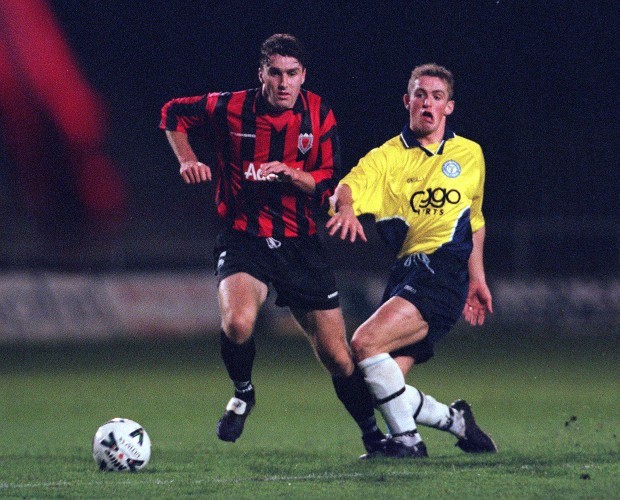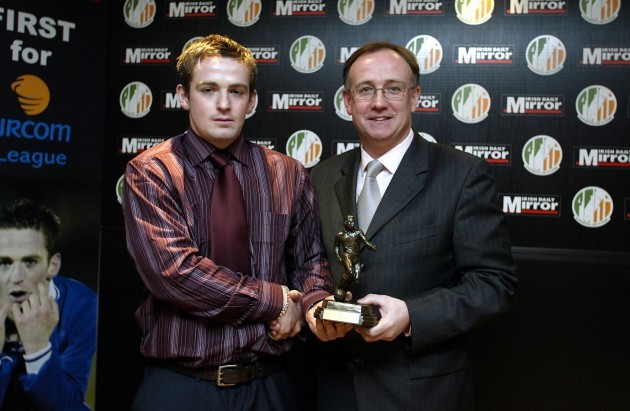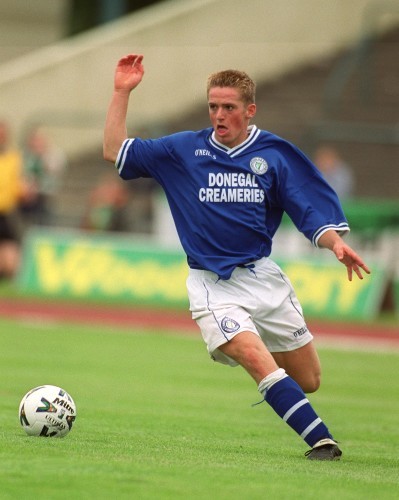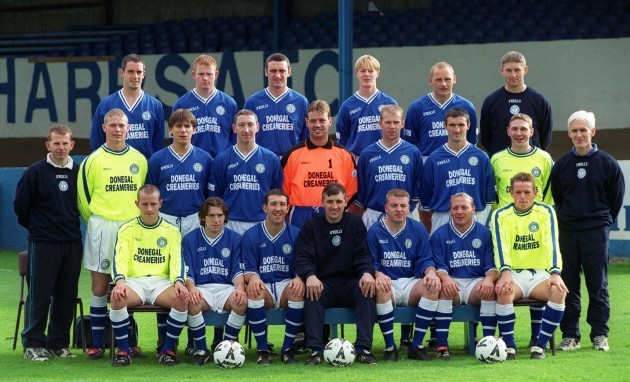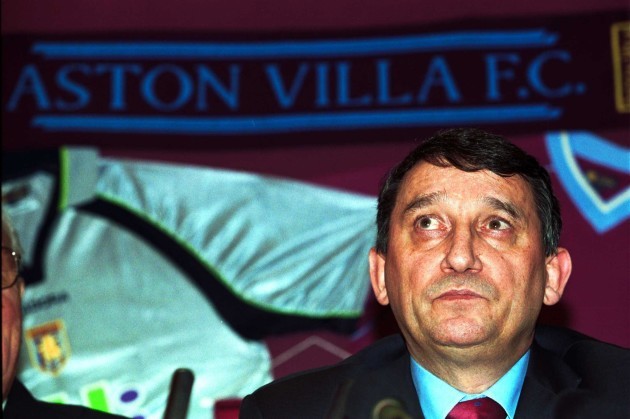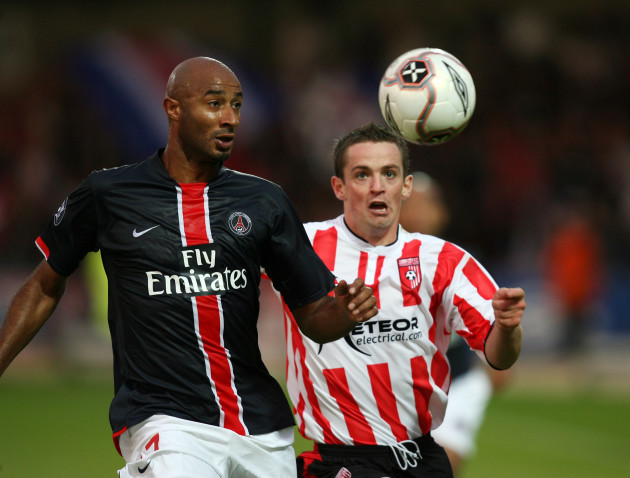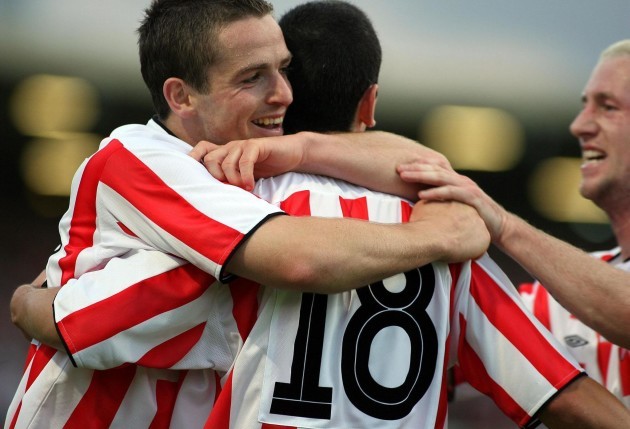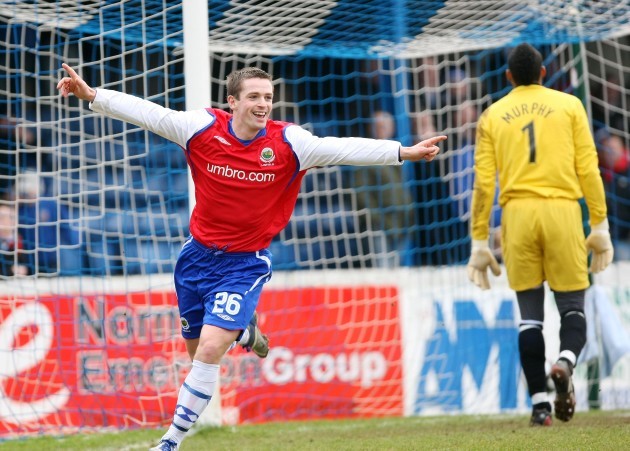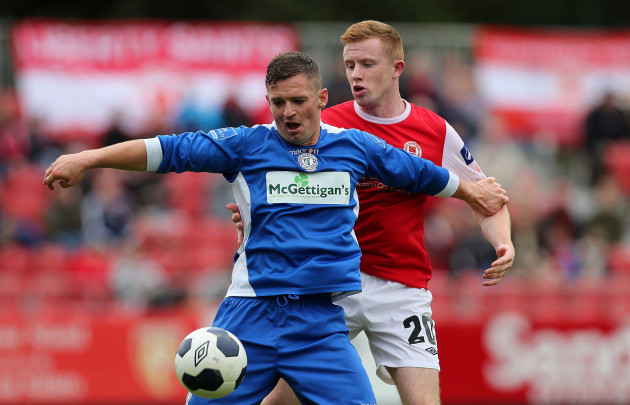KEVIN MCHUGH’S CAREER was littered with memorable moments, but one of his personal favourites was a game that few are even aware of.
In late August 2001, he was selected by Don Givens to play up front for the Republic of Ireland U21s in a behind-closed-doors match against Mick McCarthy’s senior team, who were preparing for an important World Cup qualifier.
Facing a back four that consisted of Gary Kelly, Richard Dunne, Steve Staunton and Ian Harte, with Shay Given behind them, McHugh managed to get on the scoresheet at the home of St Francis FC in Baldonnel. It was a game of little significance, but it certainly meant something for a 21-year-old who had never represented his country in a competitive game.
At Lansdowne Road later that week, when Ireland secured the decisive victory in their successful qualification campaign for the 2002 World Cup, Holland huffed and puffed but couldn’t get the better of a defence that McHugh had breached five days earlier.
Louis van Gaal had strikers from Barcelona, Manchester United, Feyenoord, Deportivo La Coruna and Chelsea at his disposal on the day. But where a young man from Finn Harps had succeeded, Patrick Kluivert, Ruud van Nistelrooy, Pierre van Hooijdonk, Roy Makaay and Jimmy Floyd Hasselbaink all failed, as Ireland knocked the Dutch out of contention to reach the following summer’s tournament in Korea and Japan.
Kevin McHugh could never lay claim to the same calibre of the aforementioned quintet, but the regulars at Finn Park who witnessed him in action over the course of 16 seasons will assure you that they wouldn’t have traded him for any other player in the world.
By the time he retired at the end of the 2016 season, McHugh had made 439 appearances for Finn Harps, in which he scored 186 times. Only Jonathan Minnock played more games for the club. Only Brendan Bradley — who remains the League of Ireland’s all-time leading scorer — managed more goals.
In addition to Bradley, McHugh’s overall tally of League of Ireland goals has only been bettered by three other players — Jason Byrne, Pat Morley and Turlough O’Connor. He was the First Division’s top marksman in four separate seasons, and while he spent the majority of his time with Finn Harps in the second tier, McHugh also proved himself in the top flight.
In spite of Harps’ relegation in 2005, he ended the season as one of the Premier Division’s top three goalscorers — only trailing Jason Byrne and Mark Farren — after finding the net 13 times in the league. He also enjoyed quite a successful three-year spell with Derry City, but not even a move to Finn Harps’ neighbours and bitter rivals could tarnish McHugh’s legendary status around Ballybofey.
It’s now 20 years since his association with the club began, yet Finn Harps continues to a play pivotal role in Kevin McHugh’s life — and vice versa. It’s therefore not surprising that it takes several attempts to nail him down to a suitable time for a chat to reflect on his career.
As well as managing the club’s U15 team, who made it to the semi-finals of the SSE Airtricity National League in 2017, McHugh has been head of the academy at Finn Harps since last October. There’s also the small matter of his full-time job in the IT department with Donegal County Council. He occasionally manages to fit in a playing role with Kildrum Tigers in the Donegal Junior League too. On top of that, there are family commitments to his wife Aine, daughter Ella (11) and son Odhran (7) to be factored in.
“I’m keeping fairly busy. When you throw in a full-time job and two kids who are also involved in football and various other things, I was actually less busy when I was playing in the League of Ireland,” he laughs.
The seeds of one of the great League of Ireland careers were sewn in a bar in Killybegs on a Saturday afternoon in the summer of 1998. McHugh, who hails from the village of Killea near Donegal’s border with Derry, had just played for Fanad United in a seven-a-side tournament which was attended by Charlie McGeever, then manager of Finn Harps.
McGeever approached McHugh in the bar afterwards and the rest is history. By snapping him up, the Harps boss had hijacked an Irish League club’s plans to sign the 18-year-old striker, who was due to meet with Coleraine the following Monday.
Despite adding McHugh to his attacking options, McGeever already had one of the League of Ireland’s most prolific partnerships — Jonathan Speak and James Mulligan — up front. McHugh admits he learned plenty from both players. Nevertheless, the prospect of challenging for a place in the team wasn’t something he found daunting.
“You would think that would have been the case, but I don’t think I ever saw it that way,” he says. “That’s just the kind of guy I was. I didn’t look to get in by trying to copy what they were doing. I wasn’t as quick as James Mulligan or technically as good as Jonathan Speak, but I thought I had other bits and pieces to put together so that there would be a role for me. That’s the way it worked out.”
The League of Ireland would evolve over the course of his career. He witnessed significant changes, most notably to how players prepared for games off the pitch, and how they approached them on it. McHugh has fond memories of locking horns with the likes of Derry City’s Darren Kelly and Dave Hill of Cork City and Bohemians.
“I went straight from the lower end of junior football into the League of Ireland,” he explains. “There were no weights programmes or strength and conditioning programmes back then, but physically I was quite strong anyway so I was able to go straight into it.
“To be fair, it was quite a rough league at the time so you just had to man up if you wanted to survive. You took your knocks, you took your bumps and you got on with it. If someone hit me off the ball it would get me fired up and make me better. I used to love that kind of thing. If a centre-half had a bite at me, it let me know that he was worried about me.
“I might have overdone it with my reactions sometimes and there were a few red cards, but I liked the battle. I welcomed it. It changed over the years, there was less contact, and in some ways I didn’t enjoy it as much. But you have to adapt.”
In their 64-year history, Finn Harps haven’t had many better seasons than McHugh’s first with the club. They finished the 1998-99 campaign in fourth place in the Premier Division, just a point adrift of Shelbourne and qualification for Europe. They also played in the FAI Cup final — three of them, to be precise.
Two replays were required before Harps and Bray Wanderers were finally separated, with a brace from Jason Byrne sending the silverware to Wicklow after Jonathan Speak put the Donegal side ahead. The defeat was bitterly disappointing for Harps and McHugh, who recalls trying — unsuccessfully — to study for exams for his computing course at Letterkenny Institute of Technology on the bus journeys to and from Tolka Park.
“That team that Charlie McGeever had, I think that was as good a team as we’ve ever had at Finn Park,” says McHugh. “Guys like Fergal Harkin, Donal O’Brien, Jonathan Speak, James Mulligan, Johnny Minnock, they were all top players. We were never good enough to challenge for the league — we knew our limits — but we were definitely good enough to make a push for Europe.
“Losing that cup final was a disaster too. I was only a young fella at the time so I was thinking there’d be cup finals every year. Little did I know that we’d still be waiting to get back into one nearly 20 years later. So that is disappointing, definitely.”
After a five-year stay in the Premier Division, Finn Harps were relegated in 2001. Earlier that season, McHugh had a brief loan spell with Omagh Town. However, he was soon recalled to Ballybofey after scoring five times in nine appearances in the Irish League.
With 27 goals, McHugh ended his maiden season in the League of Ireland First Division as its top scorer. His exploits in front of goal generated cross-channel interest. As well as scoring in that friendly against Mick McCarthy’s Ireland side, Aston Villa brought him in on trial.
After lining out for Finn Harps against Cobh Ramblers down in Cork, McHugh hit the road immediately afterwards to catch a flight from Belfast to Birmingham. He played, and scored, for a team that included Paul Merson, Mustapha Hadji and Thomas Hitzlsperger in a friendly against Wolves at Villa Park, but Graham Taylor ultimately decided not to take his interest in McHugh any further.
“I’m honest enough to admit I wasn’t good enough to be playing for Aston Villa in the Premier League,” says McHugh, who also rejected an approach from Roddy Collins at Carlisle United. “But playing a game down in Cobh and then driving through the night from there to Belfast for a flight to play a trial match, that was silly.
“I didn’t have anyone close to me who was in a position to advise me better — to pull me aside and say I shouldn’t have gone down to play in Cobh. When you’re a young fella you think you can do anything, that you’ll have no problem. But obviously it did have an effect. In fairness I actually did quite well in the game, but there was a bit of edge or energy lacking.
“Aston Villa in the Premier League was way above the standard that I could have played at, but I felt I could have done a job at another level below that. There were a few other possibilities on the table after that but I just decided to head home. I’d have some regrets about how all of that played out, looking back.”
For an FAI Cup third-round meeting with Shelbourne around that time, RTÉ sent their cameras to Finn Park to profile Harps’ in-form striker on their now-defunct ‘The Soccer Show’. Labelled “the hottest property in Irish soccer” on the programme, McHugh scored a spectacular winning goal in a 2-1 upset. Afterwards, Jonathan Speak — who by then had taken over as Harps manager, said: “If I had a choice of any striker in the League of Ireland, I wouldn’t swap Kevin McHugh for any of them.”
With McHugh topping the First Division’s goalscoring chart for the third time in four seasons, Harps were finally promoted in 2004 after sealing the title with a win over Dundalk, in which he struck twice. It was a career highlight for McHugh after Harps had endured the disappointment of respective play-off defeats to Longford Town, Galway United and Derry City in the previous three seasons.
“To do it in front of your own fans after missing out so many times, that was special,” he says. “There was a lot of hurt there. It was hard to come back and go again, especially after losing to Derry in extra-time. But we came back stronger. As a team you can either go one way or the other, and thankfully we rose to the challenge.”
When McHugh crossed the derby divide in 2006 to join Derry City, some supporters of the Candystripes hesitated to warm to him. His celebration following his equalising goal in added time in the 2003 play-off — which saw McHugh race down the track at the Brandywell, imitating a greyhound — didn’t win him many admirers on Foyleside.
“I got some abuse from a small minority but it only motivated me not to give them any other reason to give me stick,” he says. “Those things can drive you on. That’s how I dealt with it.
“It was a bit tongue-in-cheek anyway. I remember getting an award at Derry at one stage and the trophy they gave me was a greyhound. I don’t know what was going through my head with the celebration. I wouldn’t even know how to bet on a greyhound.”
Regarding his decision to leave Finn Harps for their rivals, McHugh adds: “I had been at Harps for seven or eight years at that stage, and we had just been relegated. It was just a case of now or never. Still, it’s tough to leave somewhere that you really love playing your football. You’re taking a big chance, especially by going to your near rivals.
“But I spoke to a lot of people and everyone gave the same advice. Stephen Kenny was the manager at Derry, I spoke to him and he knew me inside out, even though I had never met him before. His enthusiasm was very impressive so there were a few different things pushing me in that direction. But I always knew that it would only be for a few years before I wanted to go back.”
His debut season in Derry delivered League Cup and FAI Cup medals, while only goal difference stopped them from emulating the club’s 1989 treble-winning side. They also embarked on a memorable Uefa Cup run as summer turned into autumn in 2006.
It began when they eliminated IFK Göteborg — who were crowned Swedish champions a year later — courtesy of 1-0 wins in both legs. A 7-3 aggregate victory over Scottish Cup runners-up Gretna then set up a meeting with Paris Saint-Germain.
Derry managed to hold the French giants to a goalless draw at the Brandywell, but Edouard Cisse and legendary Portuguese international striker Pauleta sealed a 2-0 win at Parc des Princes in the second leg, which sent PSG through to the group stages.
“It was a strange one over in Paris,” McHugh recalls. “I think there was this rivalry between two sections of their supporters so you had one side of the stadium shouting at the other, and vice versa, with a game of football going on in between. That was a bit mad, and probably a bit daunting. But it was fantastic and it gave you a wee taste of what full-time football was about at that level.
“We nearly caught them off guard, which can sometimes happen, but their class eventually showed. They were a far cry from where they are now — they were going through a bad time back then — and we weren’t far away from putting them out. It was a strange feeling to be genuinely disappointed at not beating PSG in Paris, but that was the reality. Maybe we were too optimistic but we were all properly gutted because we hadn’t done it.”
He adds: “In the League of Ireland, the likes of Cork and Dundalk have blown everyone else out of the water in the last few years, but that Derry squad was right up there in my opinion. We had a really good side — a great bunch of fellas who were technically excellent as well.
“We played over 50 competitive games in that season. I think it was Paul Hegarty [Derry's assistant manager at the time] who was giving out when we went to play Paris Saint-Germain that all these extra games were going to cost us points in the league — and he was right.
“It eventually caught up with us. We ended up losing the league to Shelbourne on goal difference. You can be the victim of your own success when it comes to cups. If we could have sacrificed a cup for one more league point we would have been league champions. It definitely cost us.”
Another two League Cup medals would follow for McHugh during his three-year spell at the Brandywell — he scored an extra-time winner in the 2007 final against Bohemians — but among his most cherished memories of his time with Derry City are the times he spent in the company of fellow striker and Donegal native Mark Farren, who lost his battle with cancer in 2016.
McHugh: “Everyone knew him as a quiet lad but off the pitch he was a very funny guy, always up to something and winding people up. It’s a side of him that very few people got to see. That’s how I remember him.
“I was actually only chatting to someone about this recently. After he got sick and he was being advised not to play, he came back wearing a Petr Cech-style headguard because he wanted to break Liam Coyle’s goalscoring record and help Derry to win the league — that’s almost like something you’d be watching on Netflix. He was incredible.”
A return to Finn Harps was on the horizon when McHugh left Derry at the end of the 2008 season, but first he made a detour to Belfast for a year-long spell with Linfield, who were the Irish League’s reigning champions when he arrived.
“At that stage I’d had three years of training full-time with Derry while also working my full-time job,” he explains. “We had also just had a child and moved into a new house, so everything was happening all at once and my head was up my ass.
“I didn’t know what I was at so I needed to stop. I thought that going to the Irish League and training just two nights a week would work. But I got that wrong and it ended up being even worse. I was leaving the house at quarter to eight in the morning and getting back at midnight. It wasn’t good for the body. It was a mistake on my behalf.
“Linfield is a fantastic club which I’d never say anything bad about. They accepted me, no bother. They were absolutely brilliant. But in hindsight I probably should have picked an Irish League club closer to home instead of commuting to Belfast like that.”
A decade after he first won the race for goals scored in the First Division of the League of Ireland, McHugh managed that feat again for the fourth and final time in 2012. He also finally tasted play-off success in 2015, when BJ Banda against Limerick scored with three minutes remaining in extra-time to send Harps back to the Premier Division.
At the age of 36, McHugh had already decided that the club’s first season back in the top tier would be his last. In the end, he was forced to bring his retirement forward by a few weeks due to a freak accident in October 2016, in which he lost a finger. While coaching a training session for kids, McHugh went to retrieve a set of goalposts. The damage was caused when his wedding ring was caught in a fence he had jumped over.
The incident received international media coverage, which unfortunately overshadowed the many tributes which were paid to McHugh as one of the League of Ireland’s great goalscorers prepared to hang up his boots.
“Has it had a big impact on my life? I used to love playing golf, but I haven’t been able to go back and do that unfortunately,” he says. “That’s one of those things I definitely miss. It was a bit of a disaster at the time but you just have to get on with it.”
Reflecting on his career, McHugh says: “If I’m being honest, any time I do look back there are a lot of regrets. I made mistakes and that’s something I want to use to help the young players coming up now to not do the same. That’s what drives me with coaching now.”
When asked to elaborate, he adds: “In the earlier years in particular, you definitely didn’t look after yourself properly in terms of your diet, doing more training, making more sacrifices. It was the culture at the time but, if we’re being honest, we knew it wasn’t right but we still went ahead and did it.
“Anyone who knows me knows that I’m headstrong and I can make up my own mind. Things weren’t being done the way they should have been and I could have taken a stand on that. That definitely cost me certain things. I just really want the kids now not to make those same mistakes, because that’s something I’m annoyed with myself about when I look back.”
In his role as head of the academy, McHugh is determined to contribute to a promising future at Finn Harps, who are back in the First Division once again after relegation in 2017. He has confidence in the ability of the club’s young players, but the fifth-highest goalscorer in the history of League of Ireland is pragmatic about the challenge the club faces.
He says: “In the short term, we need to improve our stadium. There’s a lot of work going on in the academy, which will tie in with the stadium and training facilities. Until those things are in place, I don’t think we have a right to feel like we should be up there competing with the best.
“Facilities are essential in the modern game. Everyone is looking for the matchday experience, so that’s absolutely key. We have the support, there’s no problem there. If Finn Harps are doing well, the people will come out. Donegal is sport mad. There’s a lot of work going on behind the scenes to get those things sorted.
“We’ve got a lot of good young players coming through as well, so that’s what’s on the agenda in the short term. After those things happen we can talk about being competitive on a regular basis in the Premier Division. Realistically that’s a long way off, but that’s what we’re working towards.”
Kevin McHugh may already have scored his last goal for the club, but there are still many others he hopes to achieve on behalf of Finn Harps.
